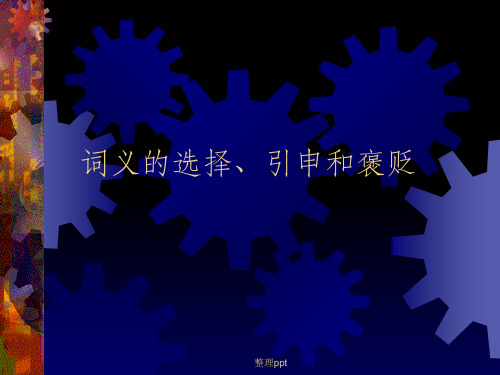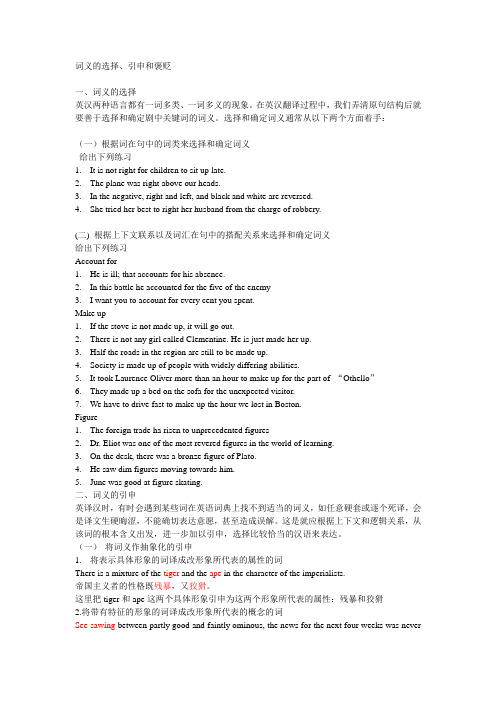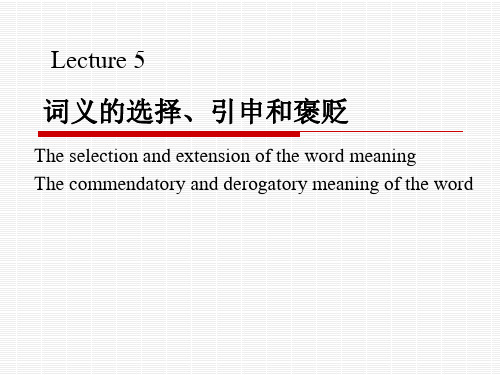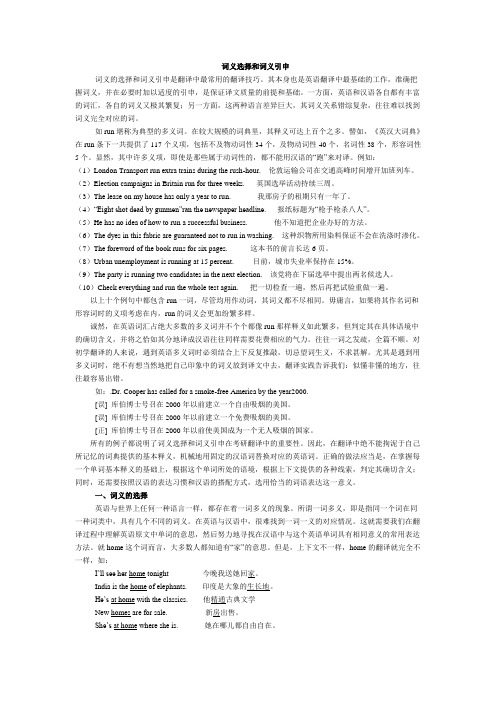词义选择与引申2
词义的选择引申和褒贬

2、将带有特征性形象的词译 成该形象所代表的属性的词。
整理ppt
1) Rich and powerful, he always goosesteps on the street.
整理ppt
1) Goosestep的原义是从名词 “鹅步、正步” 转化而来的动 词,根据上下文引申,译成: “他有钱有势,在街上总是耀 武扬威,横行霸道。”
整理ppt
2)He is in critical condition, see-sawing between life and death.
整理ppt
2) See-saw原义是“跷跷 板”,这里引申译为:他的病 况危急,时好时坏,在生死之 间徘徊。
整理ppt
(二)具体化引申
整理ppt
语时一般作具体化引申。
整理ppt
2)He is a Shylock!
整理ppt
2) Shylock是莎士比亚笔下 的人物,其人刻薄歹毒,故该 句引申译为:他凶险狡诈。
整理ppt
Every life has its roses and thorns.
整理ppt
这里把玫瑰和刺引申,译为: “每个人的生活有苦有甜。”
整理ppt
整理ppt
2)他的学位成了他进入那家 公司获得高薪的敲门砖。
整理ppt
2. 英语中有些词在特定的上 下文中,含义是清楚的,但译 成汉语时还必须作具体化引申, 否则就不够清楚。
整理ppt
1) The car in front of me broke down and I missed the green.
整理ppt
She is a good Christian, a good parent, a good wife, a good daughter and a good teacher.
英译汉中的词义确定和引申

英语中有些名词意义很活跃,许多语法特征,比如:名词的单复数形式、可数或不可数、前面有无冠词等等,都能影响词义,译法大不相同。
(1)名词的单复数词义不同,译法也有区别。例:
main(单)主线,干线mains(复)电源
mean(单)项,平均值means(复)手段,方法;财富
在进行设计的时候,我们必须要考虑许多因素。
(2)Such metals as copper and aluminum,are widely used in power industry on account of their good electrical conductivity.
像铜、铝这样的金属之所以能在电力工业中得到广泛应用,是因为它们的导电性好。
(7)After receiving high praise from the audience,the actress has her head turned.那女演员受到观众称赞后,得意忘形。(误译:那女演员……回过头来。)
(8)He is dead as I live.他的确是死了。(误译:他死了,我还活着。)
(2)The injured driver can hardly stand the pain any longer.(动词,“忍受”)
(3)Half of the membes took a stand against the proposal.(名词,“立场”)
(4)I saw one man in the whole long line pull out a paper pocket book and begin to read,standing up.(现在分词,“站立”)
词义的选择、引申和褒贬

词义的选择、引申和褒贬一、词义的选择英汉两种语言都有一词多类、一词多义的现象。
在英汉翻译过程中,我们弄清原句结构后就要善于选择和确定剧中关键词的词义。
选择和确定词义通常从以下两个方面着手:(一)根据词在句中的词类来选择和确定词义给出下列练习1.It is not right for children to sit up late.2.The plane was right above our heads.3.In the negative, right and left, and black and white are reversed.4.She tried her best to right her husband from the charge of robbery.(二) 根据上下文联系以及词汇在句中的搭配关系来选择和确定词义给出下列练习Account for1.He is ill; that accounts for his absence.2.In this battle he accounted for the five of the enemy3.I want you to account for every cent you spent.Make up1.If the stove is not made up, it will go out.2.There is not any girl called Clementine. He is just made her up.3.Half the roads in the region are still to be made up.4.Society is made up of people with widely differing abilities.5.It took Laurence Oliver more than an hour to make up for the part of “Othello”6.They made up a bed on the sofa for the unexpected visitor.7.We have to drive fast to make up the hour we lost in Boston.Figure1.The foreign trade ha risen to unprecedented figures2.Dr. Eliot was one of the most revered figures in the world of learning.3.On the desk, there was a bronze figure of Plato.4.He saw dim figures moving towards him.5.June was good at figure skating.二、词义的引申英译汉时,有时会遇到某些词在英语词典上找不到适当的词义,如任意硬套或逐个死译,会是译文生硬晦涩,不能确切表达意愿,甚至造成误解。
第二章 翻译技巧:词法翻译法

一、词的选择和意义引申考研翻译的过程和核心解题策略一、理解应以原文,拆分语法结构二、改变原文顺序,组合汉语译文词义选择和词义引申词义的选择和词义引申是考研翻译中最常用的翻译技巧。
1.在1994年72)题a leader of the new school contends 中,school 是“学派”的意思,而不是“学校”的意思;2.在1996年74)题elegant system 中,elegent是“完美,完善”的意思,而不是“优雅”的意思;3.在2001年75)题And home appliances will become so smart that ...中,smart 是“智能化”的意思,而不是“聪明”的意思;4.在2003年75)题like the concept of set in mathematics 中,set 是“集,集合”,而不是“一套,放置”等意思;5.在2004年62)题we are obliged to them 中,obliged是“感谢,感激”,而不是“被迫”的意思。
词义的选择例1.I’ll see her home tonight.今晚我送她回家。
例2. India is the home of elephants.印度是大象的生长地。
例3.He’s at home with the classics.他精通古典文学。
例4.New homes are for sale.新房出售。
例5.She’s at home where she is.她在哪儿都自由自在。
例6.Maternity homr costs in America have gone up sharply.美国妇产医院收费已经急剧上涨。
例7.Much is produced here for home market.这里为国内市场生产了许多产品。
例8.He looks on London as his home.他把伦敦看成是他的故乡。
翻译技巧一:词法翻译法

词义的选择
英语与世界上任何一种语言一样 都存在着一词多义的现象。所谓 一词多义,是指同一个词在同一 种词性中,具有几个不同的词义。 在英语与汉语中,很难找到一词 一义的对应情况,这就需要在翻 译过程中理解英语原文中单词的 意思,然后努力地寻找在汉语中 与这个英语单词具有相同意义的 常用表达方法。就home这个词而 言,大多数人都知道有“家”的 意思,但是,上下文不一样, home的翻译就完全不一样。
• • • • • • • • • • • •
Байду номын сангаас
delicate vase 容易碰碎的花瓶 delicate diplomatic question 微妙的外交问题 delicate surgical operation 难做的外科手术 delicate ear for music 对音乐有鉴赏力 delicate sense of smell 灵敏的嗅觉 delicate food 美味的食物
•
• • •
•
(一)根据词性确定词义
• 如:book这个单词,在作名 词时,意思是“书,书籍”; 用作动词却常表示“预订, 预约”的意思。又如:while 作连词时,有 “当...的时候, 而,虽然”等意思;作名词 时,却指“片刻,一会儿”; 作动词,又有“消磨”的意 思。遇到这种情况,如果不 弄清楚词性,常常就会将词 义搞错,进而影响原文的正 确理解和准确翻译。因此在 翻译中,我们可以根据语法 关系来辨别关键词的词性, 以便能准确的判断词义。
动词work在翻译时如果上下文不同,汉语习惯搭配也不一样,翻译时应 该选择不同的词义来表达。 • I think your suggestion will work. 我想你的建议行得通。 • The new treatment works like magic. 新疗法疗效神奇。 • My watch doesn‟t work. 我的表不走了。 • The sea works high. 海浪汹涌起伏。 • She worked her way to the front. 她好不容易才挤到前面。 • The root of the pine tree worked down between the stones. 松树的树根在石缝间扎下去。 • The new regulation is working well 新规定执行得很顺利。
词义的选择与引申

9). I have butterflies in my stomach. 10). When I heard the news my heart came into my mouth.
9). I have butterflies in my stomach. 译文一:我胃痛。 译文二:我有一种想呕吐的感觉。 译文三:我好紧张。 10). When I heard the news my heart came into my mouth. 译文一:当我听到这个消息时,我心都跳 出来了。 译文二:当我听到这个消息时,我很吃惊。 译文三:当我听到这个消息时,我吓死了。
6 )Every life has its roses and thorns.
6 )Every life has its roses and thorns. 译文一:生活中既有鲜花又有芒刺(荆 棘)。 译文二:每个人的生命都其玫瑰和刺。 译文三:生活总会跌荡起伏。(有平坦和 坎坷的时候) 译文四:人生总是有两面性的。
参考译文: 1. 我父亲是那家餐馆的常客, 那里所有的服 务员都认识他. 2. 请看一下上次会议的记录. 3. 在中国我们每到一个城市, 就逛大街, 逛 商店, 逛公园, 上剧院, 下饭馆.
练习分析
5). There is a mixture of the tiger and the ape in the character of the imperialists.
参考译文: 5. 帝国主义者的性格既残暴, 又狡猾. 6.每个人的生活都是有甜有苦. 7. 我们都被他那种崇高的气质所打动了. . 10. 听到这个消息我吓得要命.
二 词义的引申
词义的选择、引申、褒贬

词义引申(具体——抽象)
Grey hair should be respected(synecdoche) The pen is mightier than the sword. (metonymy) The invention of machinery had brought into the world a new era---the Industrial Age. Money had become King. (metonymy) 机器的发明使世界进入到一个新纪元即工业时 代,金钱成了主宰一切的权威。 He is a rolling stone. I don’t think he can go far. 他是个见异思迁的人,我想他不会有多大出息。
三、词义的褒贬
有些词义是中立的,本身不表示褒义或者贬义, 但在一定的上下文中可能有褒贬的意味. demanding He found that being a CEO was a demanding job. 他发现当首席执行官是个费力的工作。 As a demanding boss, he expected total loyalty and dedication from his employers. 他是个苛刻的老板,要求手下的人对他忠心耿 耿,鞠躬尽瘁。
小结(summary)
词义的选择: 根据词性来选择词义(word meaning) 根据上下文来选择词义(context) 根据搭配关系来选择词义(collocation)
二、词义的引申(extension)
引申的方法:抽象化引申 & 具体化引申 抽象化引申:具体——抽象 Do you think this dictionary of English is the supreme court in all matters concerning English words? 你认为这本英语词典是英语词汇的权威词典吗? See-sawing between partly good and faintly ominous, the news for the next four weeks was never distinct. 在那以后的四个星期内,消息时而部分有所好转,时而 又有点不妙,两种情况不断地交替出现,一直没有明朗 化。
词义选择和词义引申

词义选择和词义引申词义的选择和词义引申是翻译中最常用的翻译技巧。
其本身也是英语翻译中最基础的工作,准确把握词义,并在必要时加以适度的引申,是保证译文质量的前提和基础。
一方面,英语和汉语各自都有丰富的词汇,各自的词义又极其繁复;另一方面,这两种语言差异巨大,其词义关系错综复杂,往往难以找到词义完全对应的词。
如run堪称为典型的多义词。
在较大规模的词典里,其释义可达上百个之多。
譬如,《英汉大词典》在run条下一共提供了117个义项,包括不及物动词性34个,及物动词性40个,名词性38个,形容词性5个。
显然,其中许多义项,即使是那些属于动词性的,都不能用汉语的“跑”来对译。
例如:(1)London Transport run extra trains during the rush-hour. 伦敦运输公司在交通高峰时间增开加班列车。
(2)Election campaigns in Britain run for three weeks. 英国选举活动持续三周。
(3)The lease on my house has only a year to run. 我那房子的租期只有一年了。
(4)“Eight shot dead by gunmen”ran the newspaper headline.报纸标题为“枪手枪杀八人”。
(5)He has no idea of how to run a successful business. 他不知道把企业办好的方法。
(6)The dyes in this fabric are guaranteed not to run in washing. 这种织物所用染料保证不会在洗涤时渗化。
(7)The foreword of the book runs for six pages. 这本书的前言长达6页。
(8)Urban unemployment is running at 15 percent. 目前,城市失业率保持在15%。
- 1、下载文档前请自行甄别文档内容的完整性,平台不提供额外的编辑、内容补充、找答案等附加服务。
- 2、"仅部分预览"的文档,不可在线预览部分如存在完整性等问题,可反馈申请退款(可完整预览的文档不适用该条件!)。
- 3、如文档侵犯您的权益,请联系客服反馈,我们会尽快为您处理(人工客服工作时间:9:00-18:30)。
第四讲词义的选择、引申与褒贬词汇篇(1)词义的选择、引申与褒贬Focus:Ø 基于对源语文本的精确理解在目的语中选择恰当的词语和表达法Ø 词义的引申Ø 词义的感情色彩? 如何在翻译中选择精当的词语?Ø 注意一词多义现象,不能误用。
Ø 正确看待翻译时所使用的词典。
不能把词典当成选择词义的万能钥匙。
如果生硬地将词典的释义搬到译文中去,常易犯一些非常荒谬的错误。
翻译中,译者寻求的不只是词义的静态对应,而是词义交叉中的动态对应关系。
Ø 注意词义的灵活性(flexible),翻译中充分发挥自身的创造性。
? 一、根据词性来确定词义? 许多英语词汇往往有不同的词性,即分属于几种不同的词类。
翻译时首先要确定这个词在句子中属于哪一类词,然后再根据词类选择一个确切的词义。
? 例如:like作形容词时意思是“相同的”;作动词时意思是“喜欢、希望”;作介词时意思是“像……一样”;作名词时意思是“喜好、英雄”,如:Like knows like.(英雄识英雄)。
? 下面再以right为例加以说明:Ø Right,open your mouth,let me have a look.Ø 好,把嘴张开,让我来瞧瞧。
(感叹词)Ø He hoped to be absolutely right about this issue.Ø 他希望在这个问题上绝对正确无误。
(形容词)Ø I must answer that phone,but I‟ll be back right away.Ø 我得去接电话,马上就回来。
(副词)Ø The ship righted itself after the big wave had passed.Ø 大浪过后,船又平稳了。
(动词)Ø In England,we drive on the left side of the road,not the right side.Ø 在英国,车辆靠路的左侧行驶而不是靠右侧行驶。
(形容词)Ø He exercised his legal right as President to halt the investigation.Ø 他行使了总统的法定权力去阻止这场调查。
(名词)Ø It serves sb. right.Ø 某人罪有应得。
Ø Miss RightØ [口]理想中的未来妻子Ø Mr. RightØ [口]理想中的未来丈夫二、根据词的搭配来确定词义? 由于历史、文化的原因,英语和汉语都有各自固定的词组和搭配,翻译时必须注意它们的这种区别。
? 动词raise虽然其基本含义是“举起”,“使升高”,但在下列短语中却应当根据与它搭配的词来确定其词义:Ø raise fearsØ 引起恐惧Ø raise vegetablesØ 种植蔬菜Ø raise a familyØ 养家糊口Ø raise the deadØ 使死者回生Ø raise a fleetØ 集结一支舰队Ø raise a monumentØ 树一座丰碑Ø raise an embargoØ 解除禁运? 要注意的是,英语中有些名词单复数形式的意思大相径庭。
试比较下面名词两种形式的不同含义:Ø 1.Work 工作,works工厂、著作。
Ø 2.Time 时间,times时代。
Ø 3.Letter 字母、信,letters文学。
Ø 4.Force 力量,forces军队。
Ø 5.Paper 纸,papers文件、证件。
Ø 6.Air 空气,airs做作的姿态。
Ø 7.Manner 方式,manners礼貌。
Ø 8.Return 归还,returns利润。
Ø 9.Authority 权力,authorities当局。
Ø 10.Ground 地、场地,grounds理由。
? You cannot build a ship, a bridge or a house if you don‟t kno w how to make a design or how to read it.? 分析:build在英文中可跟三个宾语搭配,但汉语不能,需选用不同的词。
? 不会制图或看不懂图纸,就不可能造船、架桥或盖房子。
三、根据上下文来确定词义? 同一个词,在不同的场合往往也有着不同的含义,必须根据上下文的联系或句型来判断和确定某个词在特定场合下所应具有的词义。
? 现以动词develop为例,看它在不同的上下文中含义的差异。
? 1.Symptoms of SARS developed.? 非典型性肺炎的症状出现了。
? 2.We had hopes of developing light industry on quite a large scale.? 我们曾经希望大规模地发展轻工业。
? 3.Land animals are thought to have developed from sea animals.? 陆地动物被认为是由海洋动物进化而来的。
? 4.The local government is planning to develop the western areas.? 当地政府计划开发西部地区。
? 5.The photographer develops all his films.? 那位摄影师所有的胶卷都是由他自己冲洗的? 6.I'd like to develop this idea a little more fully before I go on to my next point.? 在讲下一点前,我想把这一观点论述得更充分一些。
? 7.Scientists have succeeded in developing many new plants.? 科学家已经成功地培育出了很多的植物新品种。
? 实际上,不仅单个单词的词义需要根据上下文来确定,有时候一个词组或者一句话的理解也离不开上下文。
例如:没有一定的语境或上下文,就很难判断? “Fire”!到底是上级下达命令“开火!”还是有人在大声呼喊“失火啦!”? “Not at all”意思究竟是“一点也不”还是“不用谢”;? “Tom passed.”到底是说汤姆“传了球”、“(打桥牌时轮到叫牌)而没有叫牌”,还是说他“考试及格了”?? 试比较“as luck would have it”在下列句中表示截然相反的意思:Ø a.As luck would have it,no one was in the hotel when the explosion took place.Ø 很幸运,爆炸发生时宾馆里恰好没有人。
Ø b.As luck would have it,there was rain on the day of the camp.Ø 很不幸,野营那天恰好下雨。
Classwork? 试译下列句子? 1. observe the behavior of birds.? 观察鸟的行为(习性)? 2. Do they observe Christmas Day in that country?? 在那个国家,他们庆祝圣诞节吗? 3. He observed that we should probably have rain.? 他说,很可能要下雨。
? 4. The law obliges parents to send their children to school.? 法律约束人们送孩子上学。
? 5. They were obliged to sell their house in order to pay their debts.? 6. I‟m much obliged to you.? 5. They were obliged to sell their house in order to pay their debts.? 6. I‟m much obliged to you.Ø 1. observe the behavior of birds.Ø 观察鸟类的习性Ø 2. Do they observe Christmas Day in that country?Ø 那个国家的人过圣诞节吗?Ø 3. He observed that we should probably have rainØ 他说也许会下雨。
? 分析:observe有三个基本意义:? Watch carefully 观察? Pay attention to (rules);celebrate (festivals,anniversaries,etc)遵守(规则);庆祝(节日)? Say by way of comment 评论,说? (据《牛津英汉双解词典》P773-774)? Oblige? 1.oblige sb to do sth :require 要求? 2. compel: (尤用于被动态)强迫? 3. do a favor :施惠;答应要求而作如:please ~ me by closing the door.请替我关上门。
Obliging neighbor 热心助人的邻居Ø 4. The law obliges parents to send their children to school.Ø 法律要求父母送子女入学。
Ø 5. They were obliged to sell their house in order to pay their debts.Ø 他们被迫出卖他们的房子来还债。
Ø 6. I‟m much obliged to you.Ø 我非常感激你。
Ø 1) He is the last man to come.他是最后来的。
Ø 2) He is the last man to do it.他绝对不会干那件事。
Ø 3) He is the last person for such a job.他最不配干这个工作。
